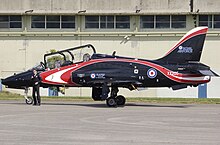British support for Iraq during the Iran–Iraq War
[3] The Guidelines were:[2] The "Scott report" on British sales to Iraq, of "non-lethal" military-related goods, as distinct from actual weapons, which took three years to prepare under the direction of senior high court judge Sir Richard Scott, criticized government handling, but also rejected that Members of Parliament tried to bias the court trying the Matrix Churchill defendants.One of the main problems highlighted in the report was the decision of the government not to inform Parliament of reforms to arms export laws for fear of public outcry.[6] Especially on the financial side, there was a complex interaction between Iraqi-controlled organizations in the U.K. and U.S. One established British company, Matrix Churchill was bought by Iraq, its British branch an important manufacturer of advanced machine tools, and its American subsidiary used as a conduit for procurement in the U.S.[7] Originally a well-established U.K. manufacturer of machine tools with a U.S. subsidiary, the firm had the U.S. operation greatly enlarged by Iraqis, using U.S. financing for Iraqi purchases that did not necessarily involve the U.K.Iraq's Nasr State Enterprise for Mechanical Industries was the main producer of Iraqi missiles and was heavily involved in clandestine nuclear and chemical weapons technology acquisition.[8] Anees Mansour Wadi, an Iraqi expatriate, set up front companies all over Europe, which could be listed as end-users for a broad range of technology and items.In Britain, he teamed with the British businessman Roy Ricks, to form Meed International, Ltd, which was renamed to Technology Engineering Group (TEG).According to Iraq's declaration to the IAEA Action Team, Iraqis went to the United Kingdom and worked with Wadi to procure items for the gaseous diffusion and the Beams-type centrifuge uranium enrichment programs.[8] The Al-Arabi Trading Co. was headquartered in Baghdad, and appears to have been under the control of Iraq's main weapons complex, the Nassr State Enterprise for Mechanical Industries.In addition, much of the correspondence related to sensitive matters such as discussions with Safa Al Habobi about money were written in Arabic to conceal the contents from the Americans working at MCC...In a July 10, 1989, memo, Al Habobi instructed employees of Matrix-Churchill to retain certain expense reports in Baghdad because they indicated that the Baghdad branch of Matrix-Churchill was paying various expenses of Iraqi military establishments.In August 1991, the Government told the Select Committee on Trade and Industry: Our examination of the records shows that the policy announced in Parliament in 1985 was adhered to both in the spirit and in the letter".In the summer of 1989, TDG and Space Research Corporation (SRC), purchased the former Learfan factory in Northern Ireland under the name of Canira, Ltd. Learfan would fabricate carbon fiber composite materials Canira Ltd submitted an application to the Northern Ireland Industrial Development Board for financial assistance towards establishing a facility at the factory to produce components for the international aviation industry.Walter Busse, Bruno Stemmler, and Karl Heinz Schaab had worked for years at MAN New Technology in Munich Germany, an important subcontractor to the German Urenco partner.Urenco[13] is owned by Ultra-Centrifuge Nederland (Dutch),[14] Uranit GmbH (German) and British Nuclear Fuels plc (UK)[15] in three equal shares.[16] Maraging steel is extremely strong, and is used in applications as minor as high-quality golf clubs and vehicle transmissions, as well as militarily critical components for uranium enrichment centrifuges, cannon, missile casings.The transactions eventually involved organizations in Iraq, France, West Germany, Great Britain, Saudi Arabia, Austria, Dubai, Jersey, and the United States."In 1986, CAAT brought to public attention the attendance at the UK government's British Army Equipment Exhibition of an Iraqi delegation headed by the country's Director of Armaments and Supplies."[17] In 1982 International Military Services (IMS), a company wholly owned by the Ministry of Defence (MoD), was given permission to repair British-made Chieftain tanks in Iraq's possession.[19] Campaign Against Arms Trade (CAAT) quoted the Sunday Times to say 20 Iraqi technicians came to the UK a £1 billion deal to establish an aircraft industry in Iraq and to build 300 Hawk jets there under licence.[20] A year later Defence Minister Geoffrey Pattie said: "British Aerospace is negotiating with the Government of Iraq for the sale and local assembly of Hawk aircraft.[22] CAAT cited several British newspapers regarding the July 1981 involvement, with the Iran–Iraq War underway, of Douglas Hurd, then a Minister of State at the Foreign Office, visited Baghdad to celebrate the anniversary of the Ba'athists' accession to power.
United KingdomBa'athist IraqIran–Iraq Warend user certificatesSingaporeJordanSouth Africaarms-to-IraqembargoForeign SecretarySir Geoffrey HoweRichard ScottMembers of ParliamentMatrix ChurchillAttorney GeneralNicholas LyellChief SecretaryWilliam Waldegrave, Baron Waldegrave of North HillParliamentIran–IraqHalabjaMember of ParliamentHouse of Commonsend user certificateDepartment of Trade and IndustryDeputy Prime MinisterMichael HeseltineGerald BullSecret Intelligence ServiceBaghdadOerlikoncarbon fiberUrenco Groupmaraging steelCymbeline (radar)BAE HawkCampaign Against Arms TradeCabinetMinistry of DefenceForeign OfficeDouglas HurdAlan ClarkLord TrefgarneExport Credits Guarantee Departmentlegitimacy of the 2003 invasion of Iraqthiodiglycolthionyl chlorideInternational aid to combatants in the Iran–Iraq WarProject BabylonScott ReportInter Press ServiceThe IndependentOffice of Foreign Assets ControlUnited States Department of the TreasuryTheGuardian.com